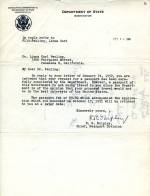|
In late 1951 Linus Pauling received an invitation to a special meeting of the Royal
Society designed to address the questions British researchers had about his and Corey's
protein structures. The date was set for May 1, 1952. In January, Pauling sent in
a routine application to renew his passport. Instead of issuing a passport, Mrs. Ruth
B. Shipley, head of the State Department's passport division, wrote Pauling that "the
Department is of the opinion that your proposed travel would not be in the best interests
of the United States." His request was refused.
Pauling was irritated but not surprised. Passports had become a political weapon since
the passage of the Internal Security Act of 1950, which broadened the government's
power to restrict the travel of political dissidents. Shipley, a fervent anti-Communist,
took advantage of her position to refuse passports to anyone she and the State Department's
security personnel - or the FBI, with which she kept in close contact -- suspected
of being too far left and too loud about it. Pauling was a committed leftist and opponent
of nuclear bombs. He had been accused of being a Communist (he was not). But the evidence
was enough for Shipley.
Pauling's English hosts were incredulous when they heard that the guest of honor was
denied the chance to visit. One of them later recalled "the shock that it produced,
the outrage at the stupidity of the State Department at detaining the great man as
if he were a dangerous character."
|
|
Click images to enlarge

Ruth B. Shipley, June 13, 1952.

Letter from Ruth B. Shipley to Linus Pauling. February 14, 1952.
"Mrs. Shipley, I think, was a scoundrel of the deepest dye."
|

